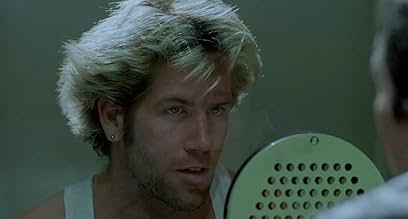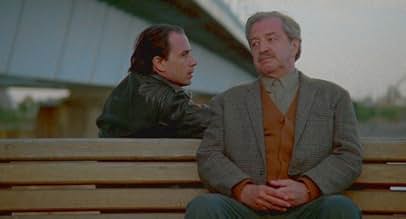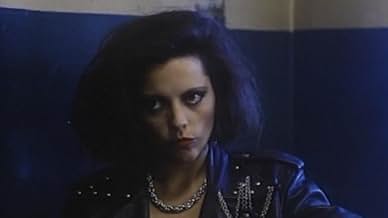Four years were necessary by this film's creative team to raise funding adequate for screening the work, with its setting in Montreal, and its essence as a narrative wayward albeit its production characteristics may well offset its storyline weaknesses for some who will view it by video tape. Winner of a record-setting 13 Genie Awards (Canada's "Oscar" equivalent), the film was the directorial début for Jean-Claude Lauzon, who received a standing ovation at Cannes in 1987 after the picture's showing there, the audience obviously of the belief that there were more than enough artistically positive elements within it to counterbalance its patchwork plot. Lauzon directed but two films prior to his death caused by piloting his airplane into the side of a mountain. He once stated of himself "I always need to be in motion", and this trait, in conjunction with a career background in advertising, probably accounts in part for his maintenance of a frenetic pace for this violence weighted affair. As action begins, Marcel (Gilles Maheu) is being stripped of any dignity that he may have possessed by being forcibly sodomized within his prison cell, and soon after we watch him exit from the prison after completing a two year sentence for some type of narcotics violation. Marcel returns to his apartment that he somehow has managed to retain during his absence and is immediately after visited by a pair of dishonest police detectives who demand $200,000 in cash that he "owes" to them and which he apparently has secreted in too cunning a manner for them to uncover. One of the detectives, George (Lorne Brass) is a homosexual steeped in sadism and it is Marcel's determined efforts to keep the hidden money from the duo while fiercely struggling physically against them that comprise about half of a plot line which also focuses upon the young man's endeavour to repair a severed relationship with his dying father (Roger Le Bel). While Marcel's behaviour upon occasion seems to be vacant of sensate purpose, a viewer will be thankful that his girl friend's appearances in the film are brief, and that the bizarre climactic scenes involving father and son are not lengthier. Some of the film's setups must be deemed as intentionally, in addition to symbolically, grotesque, and there are too many instances when both logic and continuity go begging. Endeavours by a viewer to hearken back to any sort of justification for such episodes will be futile. The earnestly diligent cast members work at creating their roles, with Brass being especially effective as an unprincipled policeman. Dialogue is largely Québécois with a sprinkling of English. Subtitles in the latter tongue are for the most part accurate. Although difficulty for viewers to ken a meandering narrative will be a bit of an impediment, the film is not dull. Well past the film's initial release date, the many awards given it for performances by its crew members are completely understandable, as production quality is never less than excellent. However, the general acclaim from Canada and at Cannes might lead one to presume that its competition may have been, at best, somewhat weak.

















